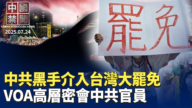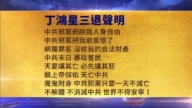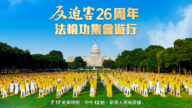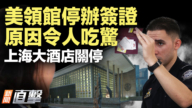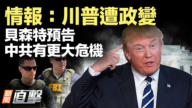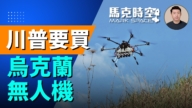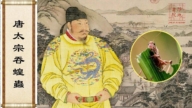【新唐人2013年03月29日讯】近年来,中国民间要求中共官员财产公开的呼声高涨,虽然1988年中共已提出了官员财产公示的立法动议,但是,时至今天,官员财产申报制度仍处于难产,对此,有中国网民分析了官员财产“不宜公开”的十大理由。
大陆网路上流传了一则网贴,讽刺的分析官员财产不宜公开的十大理由:
一、暴露贪腐会给政府抹黑;
二、会打击从政积极性,爆发移民潮,造成人才流失;
三、严重影响房产等物价稳定;
四、落马者众多,监狱不够;
五、统计部门人手短缺;
六、地方保护难以深入;
七、根繁叶茂无从下手;
八、二奶小三难以安抚;
九、财产转移还需要足够时间;
十、数字太大,会吓坏百姓!
中国《权利运动》网站负责人胡军指出,这十大理由的确是中共官员所顾虑的,因为他们清楚,他们所有的财产来源几乎都是非法所得。
胡军: “它要是公布了财产的话, 中共对中国老百姓进行掠夺的整个丑恶面目就展现出来了,所以它不公开。因为它本身这个体制的建立,就是一个掠夺中国百姓财产的过程。 掠夺的这些财产都装在中共高官口袋里了。”
3月24号上午,经济学家、国务院发展研究中心研究员吴敬琏在“中国发展高层论坛2013”年会上指出,“这些年来,城镇化是由赚取土地差价推动的,政府机构从这个差价得到的收入,最低的估计30万亿。
北京异见人士李金成指出,中共当局这些年来掠夺农民的财产,远远超过30万亿。
李金成:“像‘南宁出嫁女’,她们十几万人不是一直状告这个事吗?郭声琨在广西当书记的时候, 光贪土地款几千亿, 他不但没受到惩处,现在还成了公安部长了,现在看来,你把这些访民控制好了,就升官了。”
据报导,郭声琨在广西任职期间,非法强征土地数万亩,数百亿落入广西腐败利益集团手上。土地被征用后,当地形成了出嫁女问题,她们被拒绝参与集体经济利益分配,又没土地可种,生活无着落,近年来出嫁女上访人数达数千人。
李金成指出,自中共窃取权利以后,官僚阶级就一直靠强征暴敛掠压老百姓的财产进行利益分肥。
李金成:“现在它不敢公布财产,它太清楚了,一旦公布财产以后,可以说它立马就倒台了,现在老百姓已愤怒到极点了,你查查贪官们哪个不搞出上亿元?”
大陆自由撰稿人刘逸明表示,中共有关官员财产公开的法案已提出多年,但一直受到利益集团的抵制。
刘逸明:“最根本的原因还是中国的腐败太严重,尤其在地方上的官,几乎是无官不贪的,官场上已经形成了逆淘汰,你这个官越清越正直,你可能越难升官,甚至有可能下去,你这个官越贪越会巴结,官升的越快。”
中共新领导人上台后,高调反腐、一批“房叔”、“房婶”、“房姐”、“房妹”相继被曝光。中共民间要求官员财产公开呼声更是一浪高过一浪。
但是,在中共两会前要求“官员财产公示签名征集中国行”的发起人阮云华、张崑等人,被北京警方带走后被失踪。
两会召开期间,山西维权人士李茂林由于递送民间请愿书,要求中共官员公开财产被关押,直到3月21号才获释。
另一方面,胡军指出,如果中国的官员财产公示法案真能启动,也不会有太大意义。胡军说,公示官员财产只能作为中共官员作秀和打击政敌的工具。
采访编辑/李韵 后制/萧宇
Ten Reasons Why Declaring Assets is Unsuitable for Chinese Officials
In Chinese civil society, calls for officials
to declare assets have been growing.
A motion on officials’ asset declarations
was proposed back in 1988.
Until today, legislation does not yet exist.
China’s netizens suggest ten reasons why
the assets declaration system doesn’t suit
Chinese Communist Party (CCP) officials.
A online post suggests a list of ten reasons why
asset declaration is not suitable for CCP officials.
1. Tarnishing the regime by exposing corruption.
2. Discouraging people to go in to politics, as well
as boosting emigration, leading to loss of intellectuals.
3. Heavily destabilizing prices of real
estate and of other commodities.
4. Resulting shortage of space in jails
due to the removal of too many officials.
5. Staff shortages in state statistic departments.
6. Local corrupt officials are protected,
so it is difficult to investigate them further.
7. Asset declarations being hard to initiate, as there
are too many intricate connections among officials.
8. Difficulties of placating official mistresses.
9. More time is needed to complete the transfer
of assets, in order to hide them, before declaration.
10. The amount of assets will terrify the Chinese people.
Hu Jun, chief of NGO Human Rights
Campaign in China, commented.
These ten reasons are exactly
what CCP officials worry about.
They know clearly that their assets
are almost all from ill-gotten gains.
Hu Jun: “Their asset declarations will entirely
expose the truth about the CCP’s wealth plundering.
Therefore, it won’t allow it. The CCP ruling
system is a process of looting money.
In the end, this is all pocketed
by those senior CCP officials.”
On March 24, economist Wu Jinglian remarked
on the “China Development Forum 2013″.
Wu Jinglian: “All these years, the urbanization
has been driven by the difference in lands prices.
The government has pocketed the difference as
revenue, with a low estimate of 30 Trillion yuan.”
Beijing dissident, Li Jincheng, says that over the
decades, the CCP has plundered Chinese peasants’
wealth with a value that far exceeds 30 Trillion yuan.
Li Jincheng: “Such as the case of married women in
Nanning. Tens of thousands of them have petitioned.
Guo Shengkun, as Guangxi’s Party chief, embezzled
hundreds of Billions of yuan from land sale revenues.
But now he has been promoted as the top police chief.
So it proves that once you can control those
petitioners, you’ll be rewarded with promotion.”
Reportedly, Guo Shengkun illegally acquired lands of
tens of thousands of mu, during his term in Guangxi.
Tens of Billions of yuan have thus fallen into the pockets
of local corrupt officials, as well as the privileged groups.
Since then, lots of local married women have been deprived
of eligibility for village collective-owned economic benefits.
They have lost land, and live in deprivation.
In recent years, thousands of married
women in Guangxi have petitioned on this.
LI Jincheng remarks that since the CCP began
controlling China, it has seized civilians’ property,
and has been the way for officials to get rich.
LI Jincheng: “It does not dare to declare officials’ assets.
As it knows clearly, once it makes declarations
of assets, the regime will collapse right away.
So far, civilians have been extremely angry.
In all the exposed corruption cases, the starting
point is always over tens of thousands of yuan.”
Liu Yiming, a freelancer in China, indicates that a motion
for officials’ asset declarations was proposed years ago.
However, it has been resisted by interests groups.
Liu Yiming: “The most fundamental reason is
still corruption, which is too rampant in China.
Especially for those regional officials, almost all are
corrupt. It’s a reverse knockout rule in China’s officialdom.
The more incorruptible you are, the harder it is for you
to get promoted, and you may even be kicked out.
But the more you’re corrupt and can
curry favor, you’ll rise more smoothly.”
The new CCP administration has touted
in high-profile that it will combat corruption.
A number of CCP officials have been
exposed for owning multiple houses.
Civil society’s voices continue to rise,
urging officials to declare their assets.
Before the Two Sessions, Ruan Yunhua and Zhang Kun
launched a nationwide signature collection campaign.
This was to promote the declaration of officials’ assets.
In Beijing, both of them were taken away by the police.
During the Two Sessions, Li Maolin, a Shangxi rights activist,
submitted a petition, calling for officials’ asset declarations.
He has been detained ever since,
and was only released on March 21.
Hu Jun says that even if the declarations of officials’
assets are realized in China, it won’t make a difference.
It will only be used for show and as a tool for
striking against political opponents, he says.






